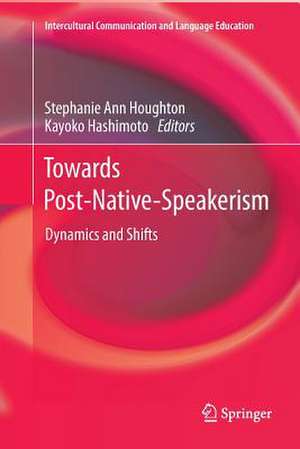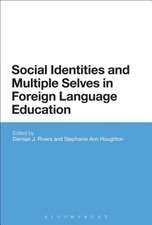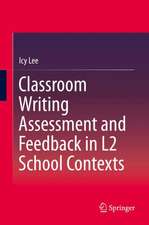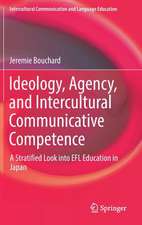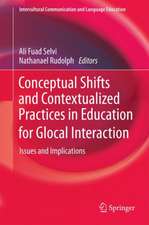Towards Post-Native-Speakerism: Dynamics and Shifts: Intercultural Communication and Language Education
Editat de Stephanie Ann Houghton, Kayoko Hashimotoen Limba Engleză Paperback – 23 dec 2018
| Toate formatele și edițiile | Preț | Express |
|---|---|---|
| Paperback (1) | 583.61 lei 43-57 zile | |
| Springer Nature Singapore – 23 dec 2018 | 583.61 lei 43-57 zile | |
| Hardback (1) | 786.84 lei 43-57 zile | |
| Springer Nature Singapore – 11 ian 2018 | 786.84 lei 43-57 zile |
Preț: 583.61 lei
Preț vechi: 686.60 lei
-15% Nou
Puncte Express: 875
Preț estimativ în valută:
111.67€ • 116.91$ • 92.40£
111.67€ • 116.91$ • 92.40£
Carte tipărită la comandă
Livrare economică 07-21 aprilie
Preluare comenzi: 021 569.72.76
Specificații
ISBN-13: 9789811355974
ISBN-10: 9811355975
Pagini: 261
Ilustrații: XXIII, 261 p. 30 illus.
Dimensiuni: 155 x 235 mm
Greutate: 0.41 kg
Ediția:Softcover reprint of the original 1st ed. 2018
Editura: Springer Nature Singapore
Colecția Springer
Seria Intercultural Communication and Language Education
Locul publicării:Singapore, Singapore
ISBN-10: 9811355975
Pagini: 261
Ilustrații: XXIII, 261 p. 30 illus.
Dimensiuni: 155 x 235 mm
Greutate: 0.41 kg
Ediția:Softcover reprint of the original 1st ed. 2018
Editura: Springer Nature Singapore
Colecția Springer
Seria Intercultural Communication and Language Education
Locul publicării:Singapore, Singapore
Cuprins
Part I Individual Teacher-Researcher Narratives related to Workplace Experience and Language-Based Inclusion/Exclusion.- 1 Overcoming institutional native-speakerism: The experience of one teacher.- 2 Native-Speakerism in Japanese junior high schools: A stratified look into teacher narratives.- 3 "They were American but shy!": Japanese university students' encounter with local students in Hawai'i.- Part II Japanese Native-Speakerism in Teaching Japanese as a Foreign Language.- 4 "Mother Tongue Speakers" or "Native Speakers"?: Assumptions surrounding the teaching of Japanese as a foreign language in Japan.- 5 Native-Speakerism perceived by "Non-Native-Speaking" Teachers of Japanese in Hong Kong.- 6 Japanese native speaker teachers at high schools in South Korea and Thailand.- 7 Japanese native speakers' perceptions of non-native speakers: Communication between Japanese medical professionals and economic partnership agreement (EPA) nurse trainees.- Part III Post-Native-Speakerism: Multilingual perspectives and globalisation.- 8 A multilingual paradigm in language education: What it means for language teachers.- 9 Going Beyond Native-Speakerism: Theory and practice from an international perspective.- 10 Jumping Scale in the World-System with English as a Lingua Franca: Branding, post-native-speakerism, and the meaning of "A Singapore".- Part IV Post-Native-Speakerism in English Language Education.- 11 The Persistence of Native Speakerism in Japanese Senior High School Curriculum Reform: Team teaching in the "English in English" initiative.- 12 Pedagogy for the Post-Native-Speakerist Teacher of English.- 13 The Integration of ELF and Social Networking into ELT: An ethnographic survey.
Notă biografică
Stephanie Ann Houghton PhD is an Associate Professor of Intercultural Communication at Saga University in Japan. She has published multiple academic books and articles in peer-reviewed international journals. She is co-editor of the book series Intercultural Communication and Language Education (Springer) with Melina Porto. Centring on the development of intercultural communicative competence, her main research areas include intercultural dialogue, native-speakerism and citizenship education. Her publications include (forthcoming) Beyond Native-Speakerism: Current Explorations and Future Visions, co-authored with D.J. Rivers and Kayoko Hashimoto (Routledge).
Kayoko Hashimoto is a Lecturer at the School of Languages and Cultures, The University of Queensland in Australia. Her main research areas are language policies and Japan’s educational policies. Her publications include (forthcoming) Beyond Native-Speakerism: Current Explorations and Future Visions,co-authored with S.A. Houghton and D.J. Rivers, Routledge; and “The Japanisation of English language education: promotion of the national language within foreign language policy” in Language polices in education: Critical issues, Second edition edited by J. W. Tollefson (2013). She has been the Language and Education Thematic & Review editor for Asian Studies Review since 2013.
Textul de pe ultima copertă
This book probes for a post-native-speakerist future. It explores the nature of (English and Japanese) native-speakerism in the Japanese context, and possible grounds on which language teachers could be employed if native-speakerism is rejected (i.e., what are the language teachers of the future expected to do, and be, in practice?). It reveals the problems presented by the native-speaker model in foreign language education by exploring individual teacher-researcher narratives related to workplace experience and language-based inclusion/exclusion, as well as Japanese native-speakerism in the teaching of Japanese as a foreign language. It then seeks solutions to the problems by examining the concept of post-native-speakerism in relation to multilingual perspectives and globalisation generally, with a specific focus on education.
Caracteristici
Explores problems presented by the native-speaker model in foreign-language education Seeks solutions to the problems presented by the native-speaker model in foreign- language education Documents some of the shifts underway from native-speakerism to post-native-speakerism Includes supplementary material: sn.pub/extras
